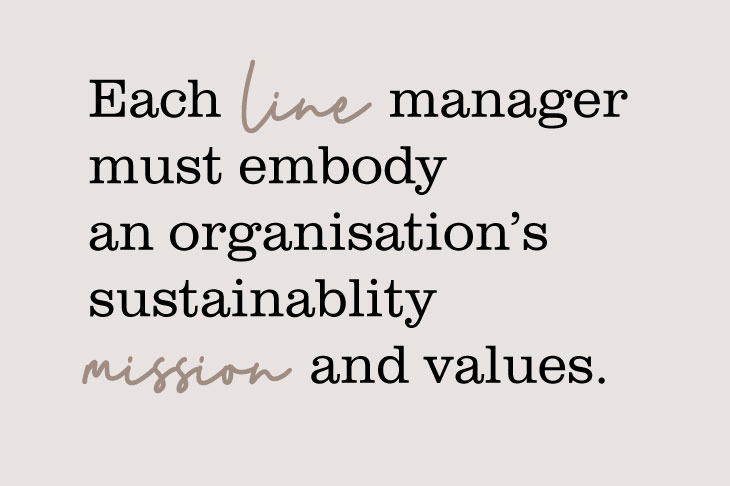- Perspective
- Sustainability
Why should we nurture a culture of sustainability in B2B brands?
Building a culture of sustainability is a process. It involves a collective effort founded on a clear ESG and sustainability strategy. As a global community, B2B brands are grappling with environmental challenges and impending deadlines – they’re at the forefront of a transformative journey.

Amidst our global ambitions, brands are discovering numerous hurdles—whether foreseen or surprising—that involve people. Only by mobilising an entire workforce and establishing a culture of sustainability can B2B brands realise their sustainable vision. Simon Hall, Brand & Strategy Director, has delved into more detail…

What is a culture of sustainability?
A culture of sustainability transcends mere rhetoric; it’s more than soulless jargon. Instead, it’s something holistic that should be engrained within the very essence of an organisation. It goes beyond mission statements and otherwise encourages a shift in mindset, decision-making and daily operations. It’s a collective response that ensures a business is united and committed to tackling the very real challenges of today to ensure a sustainable tomorrow. After all, culture is community, and community is its people.

Unfortunately, when B2B brands face such a seismic cultural shift, apprehension and resentment often ensue. Senior leaders often assume concerns stem from the fear of the unknown, but the reasons are more complex and subtle. To alleviate this, leaders must clearly understand what they’re trying to achieve and explain why.
Why do B2B brands need a sustainability culture?
The discussion of ‘why’ should be openly held within any organisation. Why leads to the creation of strategies and is swiftly followed by the what, how and when. At this point, when employees are given an entirely new roadmap, there are often questions about decision-making as they’re not privy to some of the challenges and conversations brought to the fore at a senior level. Of course, sensitive information cannot be shared. Still, if a culture of sustainability is to be embedded into the very fabric of an organisation, employees must be brought into the discussion sooner rather than later.
So, what needs to be communicated? Well, a culture shift is both ethically imperative and pragmatic. Leaving aside looming carbon emissions targets for a moment, cultural shifts need to be founded on more than just regulatory requirements. It’s about fostering innovation, building brand reputation and supercharging resilient processes that can withstand current and future market demands. Moreover, a sustainability culture can unleash new opportunities within an organisation.
The need for a top-down strategy and middle-management buy-in.
Leadership teams play a vital role in shaping an organisation. Our Accelerator team and sustainability consultants have worked closely with many B2B brand leaders, and we cannot emphasise the importance of unity when communicating a sustainable vision. This is particularly prevalent when engaging not only middle managers, but the wider business, as they’re the people who can advance a sustainable culture more efficiently ‘from the ground.’

Each line manager must embody an organisation’s sustainability mission and values – demonstrating that they’re not just empty words used in B2B marketing strategies or brand campaigns. It’s at the core of all activities. Managers can do this by implementing sustainable initiatives, drawing attention to sustainable achievements and repeating, repeating, repeating. New habits take time – and so does establishing a new culture. Sustainability should become a part of the narrative in every interaction.
Challenges, commitments and KPIs.
Of course, we’re bound to encounter twists and turns with any narrative. Decisions – particularly around something as involved as sustainability – can be complex, which means that when faced with challenges from employees, you must be sure of your commitments. This means developing KPIs that are reasonable and logical. When employees understand purpose and structure better, long-term sustainability actions can be facilitated more easily. If managers can break down sustainable habits into smaller, more achievable milestones, employees will automatically feel the benefits of progress. This will lead to greater motivation and encourage a more positive, sustainable culture.
One step at a time.
Building a culture of sustainability will not happen overnight; it takes time. At Wyatt International, we’ve encountered many B2B brands at differing stages of the journey, all heading towards that circular, regenerative utopia. To some, this final destination can seem somewhat like a dreamland. But if we don’t start now, when?
Our B2B Accelerator Consultancy and associated sustainability consultants work with international B2B brands, helping them build strategies, create new value propositions, and navigate the challenges in today’s rapidly evolving landscape. With a narrowing window for action, brands must develop a sustainable culture that creates lasting value for their employees, stakeholders, and the planet. With a narrowing window for action, it’s time to hit the accelerator.
